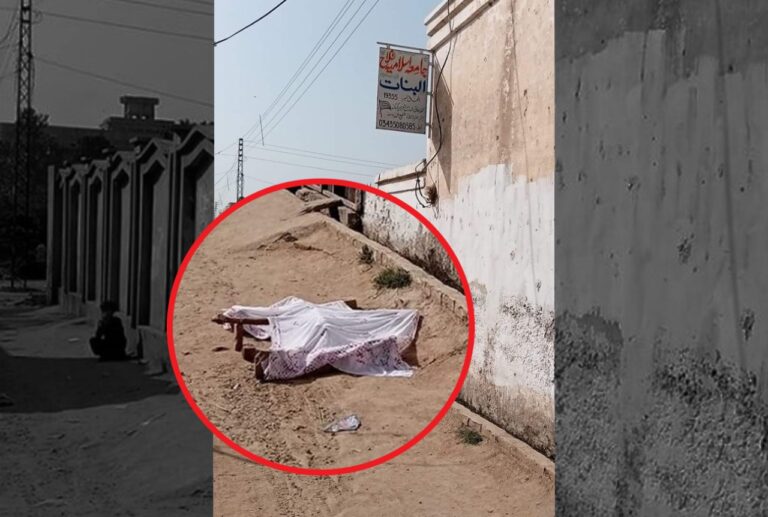
Three female teachers at a local madrassa in Khyber Pakhtunkhwa’s Dera Ismail Khan district killed a former coworker on Tuesday over alleged blasphemy, police said.
District Police Officer (DPO) Najamul Hasnain told the media that the murder occurred early in the morning outside the Jamia Islamia Falahul Binaat in the Anjumabad area. He said that police had found the victim lying in a pool of blood with her throat slashed.
According to a police statement, 24-year-old Umra Aman, 21-year-old Razia Hanfi, and 17-year-old Aisha Nomani killed the 21-year-old victim over “difference of opinion on religious issues” and allegations of blasphemy. It said the suspects also disliked the victim because she was a follower of renowned religious scholar Maulana Tariq Jameel.
READ MORE: Top Islamic forum declares anti-blasphemy violence against Shariah
“The three accused ladies have so far disclosed that one of their relatives, about a 13-year-old girl, had seen a dream last night that the Holy Prophet (PBUH) had directed them that the victim had committed blasphemy and should be slaughtered,” the statement read, according to a media report.
The statement said that three of the women “materialised the dream seen by the fourth one”. The 13-year-old relative has also been arrested. The police have recovered the murder weapon and a register containing the details of the ‘dream’. Eyewitnesses told media outlets present on the scene that the three accused chanted religious slogans when the police was taking them into custody.
Shafiullah, a teacher at the madrassa, said that the victim was falsely accused of blasphemy, and that she was a “true Muslim”. He added that the accused had earlier alleged that the teachings of the madrassa were not in accordance with the principles of Islam but they had later apologised.
The accused women belong to the Mehsud tribe and hail from South Waziristan tribal district and were currently residing in Anjumabad area of DI Khan.
Wafaqul Madaris al Arabia Pakistan, which is a board of seminaries, condemned the murder and demanded an independent and fair investigation into the incident.
FALSE ALLEGATIONS
False accusations of blasphemy are common in Pakistan, often motivated by personal vendettas or religious hatred. The highly inflammatory accusations have the potential to spark mob lynchings, vigilante murders and mass protests.
In February, vigilantes in Khanewal village lynched a mentally unstable man for allegedly committing blasphemy. The tragedy came as a grim reminder of the Sialkot lynching in December 2021, drawing condemnation from the government as well as opposition parties that believed the gruesome incident humiliated the entire nation.
On March 16, 54-year-old Fansan Shahid, a Christian employee of the Pakistan Railways, was arrested by the Federal Investigation Agency’s Cybercrime Circle Gujranwala on allegations that he made a blasphemous comment on a Facebook post.
READ MORE: Activists say mob violence in name of religion must end
The government’s failure to curb the misuse of the blasphemy laws is emboldening false accusers, rights activists say.
According to a Centre for Social Justice (CSJ) report titled ‘Human Rights Observer, every second accused of blasphemy happened to be a Muslim, adding that as many as 84 persons had been booked under blasphemy charges throughout Pakistan in 2021.
According to the report, 42 people accused of blasphemy were Muslims followed by 25 Ahmadis, seven Hindus, and three Christians.
The data further revealed that 81% of cases have been reported in Punjab province alone. As many as 68 cases were reported in Punjab followed by seven in Islamabad, five in KPK, three in Sindh and one in Azad and Jammu Kashmir.
At least 40 percent of the cases were reported from three districts of Punjab: Lahore, Sheikhupura and Kasur. As many as 11 cases were registered in Lahore, 13 in Sheikhupura and 10 in Kasur.
READ MORE: Fears grow amid surge in anti-blasphemy violence in Pakistan
The report put forth wide-ranging recommendations to prevent such incidents and quoted the recommendations made in the judicial inquiry held to investigate the Gojra incident in 2009.
It said that the probe report had put forward 10 recommendations, including a legislative review of the laws, administrative and educational measures.
The report also called for bringing legislation to introduce safeguards against the abuse of blasphemy laws, prosecute and punish the perpetrators using the allegations of blasphemy and incitement to violence, compensate people wrongly accused of their losses and provide security to the accused and ensure adequate protection of the accused, judges, prosecutors, lawyers and witnesses in blasphemy cases.